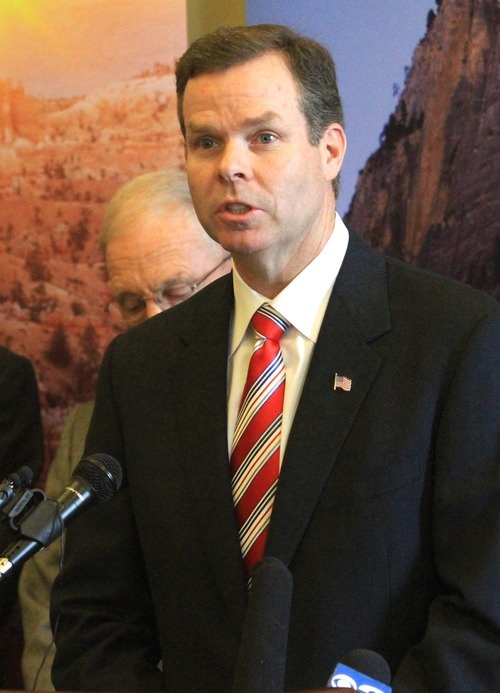This is an archived article that was published on sltrib.com in 2012, and information in the article may be outdated. It is provided only for personal research purposes and may not be reprinted.
John Swallow, candidate for attorney general, was on the defensive during a televised debate Sunday morning when he was pressed about whether those who gave large donations — including one for $250,000 — would influence the way he ran the office.
That $250,000 donation came from a Super PAC called the Republican State Leadership Committee and has received donations from groups such as Wynn Resorts, Karl Rove's American Crossroads group and a variety of pharmaceutical companies.
Swallow said the RSLC is no different than getting donations from the National Republican Congressional Committee or the Democratic Congressional Campaign Committee.
"We'll make sure when I'm in office, that I'm executing the laws — that I'm not giving a preference to anybody who has contributed or not and that I'm functioning as an attorney general when the election is over," Swallow said.
The single donation of $250,000 is more than five times what his Democratic opponent, Dee Smith, has raised. Smith's largest contribution came as a result of a luau that raised $1,596. He has raised a total of $47,000.
Swallow has raised about $1.2 million.
Smith, while bemoaning the overall amount of money infused into campaigns, didn't take the opportunity to criticize Swallow's fundraising directly when KSL-TV's Richard Piatt, the moderator, asked if the donations could create conflicts of interest.
"I don't think it's fair for me to comment on that," Smith said.
Smith, the Weber County attorney, also admitted he initially had been what Piatt called "a reluctant candidate" before deciding to run.
"I had initially declined the invitation to run for this office," Smith said. "After I spent some time to consider it ... I recognize the importance to have balance in state government and the importance of having a prosecutor running that office."
The 20-minute debate, which was taped earlier in the week and was the first between the two men, didn't reveal much daylight between the candidates on how they would tackle issues such as polygamy and illegal immigration. Both said they would only prosecute polygamy in instances of child abuse or welfare fraud, and both supported HB497 — Utah's version of Arizona's enforcement-only law that attempts to give local police some ability to determine legal status of those arrested for crimes.
The biggest area of disagreement between the candidates was on whether the attorney general should actively engage in what Smith decried as "message lawsuits."
Smith thought at least two of those — Utah's fight to reclaim federal lands and the state's attempt to battle the Affordable Care Act — were a waste of taxpayer dollars.
"I'm not a fan of the message lawsuits where we want to just take on the federal government and make a point," Smith said.
Swallow said, however, that not taking up those fights keeps Utah from tapping into needed resources.
"If we don't have the ability to create the jobs and have the income taxes to fully fund education and if we don't have access to our energy, we'll never get it done and it's why we're so far behind right now," Swallow said.
Twitter: @davemontero



